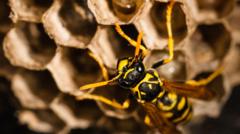A radioactive wasp nest with radiation levels ten times of what is allowed under regulations was found at a facility that once produced parts for US nuclear weapons, federal officials said.
“The wasp nest was sprayed to kill wasps, then bagged as radiological waste,” says a US Department of Energy report released last week. No wasps were found at the site near Aiken in South Carolina.
Investigators say the contamination is not related to a nuclear waste leak, and that there was no impact to “the environment, or the public”.
Environmental groups have criticised the government’s handling of the situation.
The nest was discovered by workers who routinely inspect for nuclear radiation at the Savannah River Site (SRS) near Aiken, on 3 July.
It was found on a post nearby to where millions of gallons of liquid nuclear waste are stored, but there was no leak from the waste tanks, the report said.
Investigators attribute the dangerously-high levels found on the nest to what is called “onsite legacy radioactive contamination” – the residual radioactivity that remains from the time when the site was actively producing parts for nuclear bombs during the Cold War.
The site opened in the 1950s, when it was creating plutonium to be used in the core of nuclear bombs. It continues to operate today, but with a focus on nuclear material for power plants.
The energy department report notes that the wasps that lived within the nest would have significantly lower radiation levels than the nest itself.
It also points out that wasps generally fly only a few hundred feet from their nest, and that the nest was found in the middle of the 310-square-mile Savannah River Site – meaning there is little chance they flew outside of the facility.
“No contamination was found in the area,” the report notes. “There were no impacts to workers, the environment or the public,”
Savannah River Site Watch, a watchdog group that monitors the site, said that many questions remain unanswered.
“I’m as mad as a hornet that SRS didn’t explain where the radioactive waste came from or if there is some kind of leak from the waste tanks that the public should be aware of,” spokesman Tom Clements told the Associated Press.
The site once generated more than 165 million gallons (625 million litres) of liquid nuclear waste, according to Savannah River Mission Completion.
There are still 43 of the underground tanks in use, while eight have been closed.



